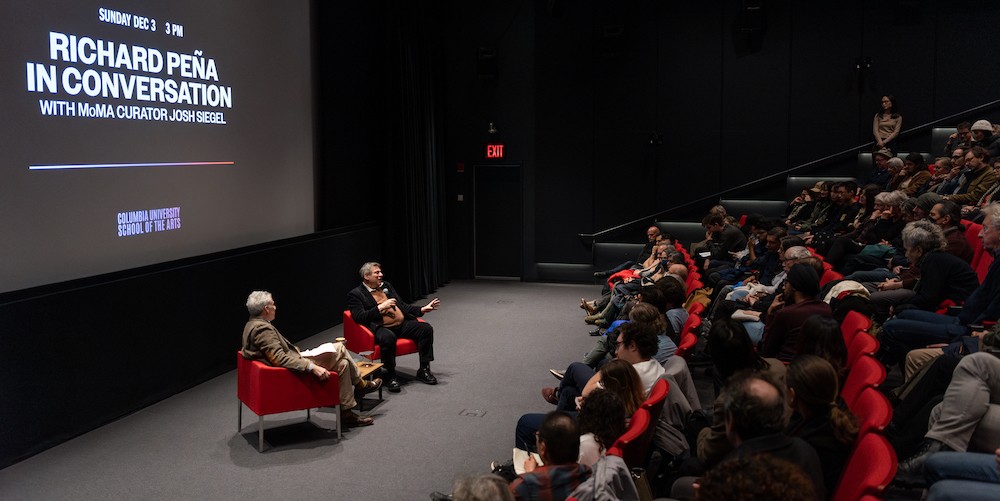His Voice, His Legacy: Professor Richard Peña Leads Celebratory Film Series
Professor of Film and Media Studies Richard Peña has helped shape the New York film landscape, showcasing the pluralism of global cinema to audiences and working towards broadening opportunities in the industry. Over the past thirty years, he's served as the director of programming at the Film Society of Lincoln Center and the head programmer of the New York Film Festival, and as host of Reel 13 Classics on PBS channel Thirteen. Last December, as he approached his retirement, Peña reflected on his career by selecting six influential films to screen from December 1 to December 3, 2023 at The Katharina Otto-Bernstein Screening Room in Columbia University School of the Arts's Lenfest Center for the Arts.
The films in this three-day festival, called Richard Peña Selects, ranged from classic Hollywood noir like Kiss Me Deadly to one of the last films made in Shanghai before the Cultural Revolution, Two Stage Sisters, which follows two female opera performers. The selections—mostly lesser-known, with limited public reach—captured the wide scope of Peña’s curatorial interests and his dedication to diversity.
Law of Desire (La ley del deseo), directed by Pedro Almodóvar, portrays romantic relationships between gay and trans characters. Structured around three stories, The Day I Became a Woman (Roozi ke zan shodam) marks Marziyah Meshkini’s directorial feature debut, following different Iranian women at different stages of life, from a young child to an older widow. In Residue, written and directed by Merawi Gerima, an aspiring filmmaker returns to his gentrified childhood home, culminating in an exploration of generational change.
During the festival, Peña joined Museum of Modern Art (MoMA) curator Josh Siegel at the Lenfest Center for the Arts for a conversation about his career as an educator and curator. Siegel described Peña as a “beloved teacher” at Columbia University before making note of Peña’s “profound impact” on the New York Film Festival, discussing the implementations he made and the legacy he inherited.
“The important thing to remember is that I arrived at the Film Festival in 1988, and the field was really changing,” Peña said. “I had access to films from all around the world, in a way that [former directors] would have had a far more difficult time. In a certain way, the changes that I brought were the changes that were happening simply with cinema. Now, suddenly, we knew about Chinese cinema. Now we were discovering Iranian cinema. Now we could have access to films from many more parts of the world. Happily, I think, the programming of the Festival reflected that, but it was less something we caused than something to which we reacted.”
While discussing the evolution of films screened at festivals, Siegel brought up the misconception that streaming platforms increase access to “every movie ever made” before Peña noted that every jump to new technology and new formats—35mm to 16 mm, VHS to DVD—resulted in losing films and losing access to research.
This relates to the evolution of the “committee experience,” according to Siegel. “I remember vividly when you and my own colleagues would work on New Directors/New Films and you would watch films on 35mm very often,” he said. “You would watch them together. I’m on the committee now for New Directors, and to be quite frank, we watch things on links individually. We don’t watch them collectively anymore, and something is really lost.”
“I’m one of those people who’s not terribly upset about the transference from photochemical cinema to digital cinema—I’ll take it,” said Peña. “I can’t stand the fact that I fear we’re losing theatrical cinema. The idea that we’re not going to see movies projected and watch them in a group situation is something that really pains me personally.”
Peña described the joy of getting to watch Kiss Me Deadly with a full audience at the film's screening the previous day. “It’s not the way most people watch movies anymore,” he said.
This spirit of independent cinema and collective viewing imbue Peña’s commitment to the programs and initiatives he supports within the industry. Since 2016, he has been part of “American Fringe,” a series dedicated to highlighting the genuine essence of American independent films from all over the country—a series which offers Peña hope as it celebrates artists who are “exploring the margins of American society and using cinema to bring ‘fringe’ experiences and spaces front and center.”
“There are still the dreamers out there,” Peña said. “There are still the people who are making these crazy, wonderful films that don’t obey any rules, that just do what they want, show you something you’ve never seen.”
Near the conclusion of the conversation, Siegel asked Peña about his aspirations for the Film Program following his retirement.
“I want it to become what the people who work in it want it to become,” Peña said. “This new generation is going to find what interests them. I think it changes, and with those changes, new things will be discovered.”
At the Film Society of Lincoln Center, Peña has organized retrospectives of Michelangelo Antonioni, Sacha Guitry, Abbas Kiarostami, Robert Aldrich, Gabriel Figueroa, Ritwik Ghatak, Kira Muratova, Youssef Chahine, Yasujiro Ozu, Carlos Saura and Amitabh Bachchan, as well as major film series devoted to African, Chinese, Cuban, Polish, Hungarian, Arab, Korean, Japanese Soviet, and Argentine cinema. During his tenure at Columbia University, he founded the MA program in Film Studies: History, Theory and Criticism (HTC), renamed the MA program in Film and Media studies, where students study what cinema has been historically as both an American and an international sociocultural phenomenon.
